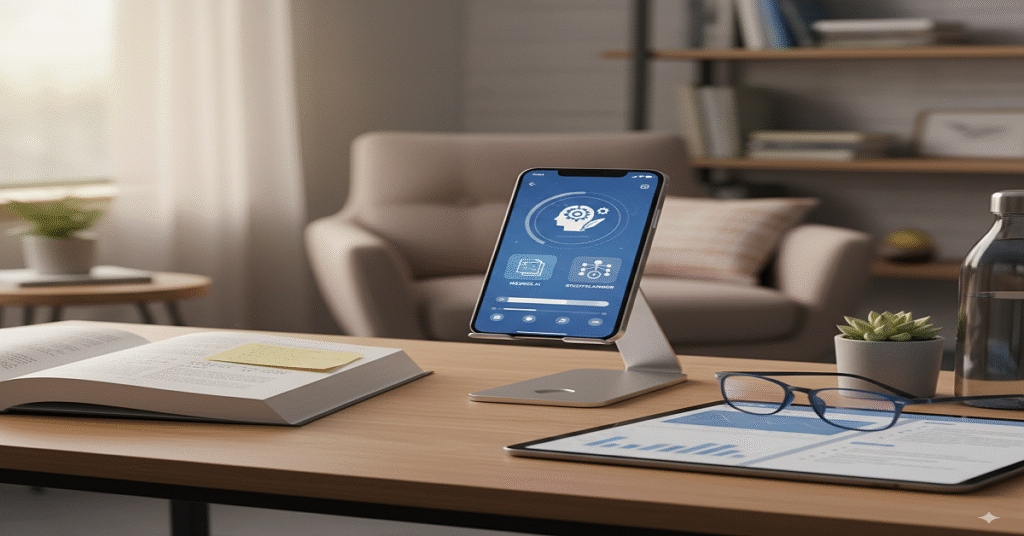How to Pass Exams with Top Grades: Proven Study Hacks & Success Guide
Introduction
You have read hours, and when the exam day comes your mind fails to think. Or perhaps, you sacrifice the lack of sleep just to get the grades that do not justify your hard work. You are not alone as far as that sounds familiar. Good grades open opportunities to scholarships, career, confidence, and reduced stress though exams are not about memorizing. It is a fact that anybody can perform well on the test by learning smarter, but not by working harder. In this guide, you will know tips and tricks of preparing, time management and more and perform with confidence.
Building Awareness
Common Struggles Students Face
The dream of all students is to enter an examination hall, feel relaxed, prepared and ready to pass in the exam. However, to most of them the situation is the opposite of the case. We can discuss hardships the majority of students go through: difficulties that complicate exams to be more difficult than they should be.
1.Lack of Focus
In the modern era of constant messages, social media and distractions, it is nearly impossible to concentrate on the study content. You are at your desk and you are going to read a chapter but you are checking your phone or daydreaming five minutes later. This distraction not only consumes valuable study hours but it also makes the learning process frustrating. Even hours of study cannot be converted to good performance in exams without concentration.
- Procrastination
We have all said that, I am going to start tomorrow. One of the greatest adversaries of exam success is procrastination. Most students procrastinate to study at the last moment due to the overwhelming nature of the task or its dullness. But procrastination does not only steal time, it creates pressure. When students finally get to exams, they are in a race against time where they wish they hadn’t spent so much of their time at Netflix or scrolling through Instagram.
- Cramming at the Last Minute
Due to procrastination, cramming is a solution. Students spend bright nights in attempts to pack the contents of a whole semester into their brains. Though this might be productive in the short term, cramming is not usually an effective method of long-term retention. Rather, it causes stress, lowers the quality of sleep, and frequently leads to blanking out on the exam. Cramming is not a strategy, but it is a band-aid.
- Forgetting Information During Exams
The second thing that is universal is forgetting what you learned at the time when you need it the most. You may have encountered this situation: you read about a subject extensively, and in the test, you cannot remember anything. This does not necessarily indicate laziness-most of the time it is a result of poor studying methods. The brain does not remember information by simply reading and highlighting. Information dies in no time without active remembering and practicing.
- Stress and Anxiety
Even best equipped students have difficulties with exam stress. Exams can be overwhelming due to fear of failure, family or teacher pressure and peer competition. Stress influences concentration, memory and confidence. Some of them even develop physical symptoms such as headaches, tiredness, or panic attacks as a result of anxiety. Uncontrolled, stress becomes an even greater challenge than the exam itself.
The good news? These are common struggles and they are universal as every student experiences it at one stage. Their approach to these challenges is the difference between average and top performers. These barriers can be overcome with the help of the right techniques that will help you make exams a chance to demonstrate your efforts.
Why Exams Matter in the Bigger Picture?

At first glance, exams may be considered as an additional obstacle to school or college. However, in practice, they influence much more than the classroom. That is why it is important to study exams and not only your grades can be changed after that, but also your future.
- Career Opportunities
Good grades open doors. Academic performance is a filter of opportunities by many employers, universities and competitive exams. As an example, high-scoring in high school can help you to enter one college over another and good college grades can help you to secure an internship and a job placement. Good results in exams demonstrates to employers and institutions that you are disciplined, hardworking and can handle pressure.
- Scholarships & Financial Aid
Education can be costly to a substantial number of the students. Scholarships and grants can give a person a relief financially- but they are usually accompanied by grades eligibility requirements. Exam success gives you high chances of scholarships that cost you thousands of dollars in tuition fees and living expenses. In certain instances, good performers are even offered full scholarships that fully finance their education.
- Self-Confidence & Motivation
Exam more than an academic burden is a confidence booster. When you do a good job it makes you feel that you are good. Success will give you an incentive to do better, and continuous success will achieve resilience and a growth mentality. Conversely, low performance may damage self esteem and that is why it is necessary to implement effective measures. The final result of grades is your potential and not stress or absence of strategy.
- Personal Growth & Discipline
Education on exams provides more than academic skills in life. You learn time management, goal setting, persistence, and dealing with pressure among other useful lessons in the course of study. These are skills that remain with you even after you graduate. In a lot of respects, exams represent a simulation of real life: work time limits, project planning or situations where it is essential to stay on track when under pressure. Learning how to pass exams can now be considered a foundation to success in any sphere of life.
The larger perspective is evident: tests are not only about memorization of the textbooks. They are stepping stones to career choices, personal financial freedom, personal confidence, and a life-long skill. Exams will appear less like a burden and more like an investment in yourself when you switch your mindset to not having to pass but doing it to prepare me in the future.
Core Message
The reality is straightforward: it is not about studying more to pass the exams but smarter. You do not need to compromise on the well-being of your health, social life, and sleep in order to succeed. You require a system that will assist you to stay focused, remember, and act confidently when the pressure is on.
By employing powerful tactics, your study will not be a struggle anymore, but it will become a goal. You will spend your time in a manner that will produce the best results rather than spending hours on memorizing.
The secret approaches to time management, revision tips and stress management that can teach you how to perform your best without being exhausted. That is precisely what this guide will demonstrate to you: how to study smarter, develop confidence, and be confident that you are ready to achieve your highest level of performance when you enter any exam.
Consideration
Study Strategies That Work

All students desire results, not everyone studies in the manner that will assist the brain to learn and remember. Rather than reading notes over and over again, use these tested methods that have been used by best students to memorize information and be able to perform during exams.
- Active Recall: Test Yourself, Don’t Just Read
Passively rereading textbooks or notes is one of the most common errors of students. It seems that you are productive, yet your brain does not work; it is merely scanning data. This is reversed in active recall. Rather than posing the question, have I seen this before? your brain poses the question, Can I remember this without looking?”
How to use it:
- Close your book and write down everything you remember from a topic.
- Use flashcards (digital apps like Anki or Quizlet work great).
- After reading a chapter, quiz yourself with practice questions.
The more you test yourself, the stronger your memory gets.
- Spaced Repetition: Review at Intervals
Have you ever studied something perfectly only to forget it a week later? That’s the “forgetting curve” at work. Spaced repetition beats it by reviewing material at increasing intervals—right before you’re about to forget.
Example schedule for one topic
- Day 1: Learn it
- Day 2: Review once
- Day 4: Review again
- Day 7: Quick recap
- Day 14: Final review
By spreading reviews out, your brain signals, “This information is important, don’t delete it.”
Tools to use: Anki, Quizlet, or even a physical revision calendar.
- Pomodoro Technique: Study in Bursts
Studying for hours without breaks drains focus and lowers productivity. The Pomodoro technique helps you maintain high concentration while avoiding burnout.
How it works:
- Study for 25 minutes (no distractions).
- Take a 5-minute break (stretch, drink water).
- Repeat 4 cycles, then take a longer 20–30 minute break.
This keeps your mind fresh and helps you avoid the trap of endless, unfocused study marathons.
- Mind Maps & Visual Notes
If you’re a visual learner, diagrams and connections help concepts stick better than plain text. Mind maps turn complicated topics into easy-to-understand webs of ideas.
How to use:
- Start with a main topic in the center.
- Branch out into subtopics, definitions, and examples.
- Use colors, symbols, or drawings to make it memorable.
Visual notes are especially powerful for subjects like history, biology, or literature, where linking concepts matters more than rote memorization.
Time Management for Exam Prep

Even the best strategies won’t work without proper planning. Time management is the foundation of exam success. It ensures you cover the syllabus, revise thoroughly, and still get rest.
- Create a Realistic Timetable
Cramming everything into the last week won’t cut it. A timetable spreads learning across days and weeks, reducing stress and improving retention.
Steps to create one:
- Write down all subjects and topics you need to cover.
- Break big topics into smaller, manageable chunks.
- Assign each chunk to specific study sessions.
- Leave buffer time for revision and unexpected delays.
Keep it realistic. Don’t schedule 12 hours a day—you won’t sustain it.
- Prioritize High-Weight Topics First
Not all topics are created equal. Some chapters carry more marks or are frequently asked in past papers. By tackling high-weight areas first, you maximize your score potential.
Example: If algebra makes up 40% of the exam, mastering it early gives you a huge head start, even before you perfect smaller topics.
- Balance Revision with Rest
Many students underestimate the power of rest. Sleep isn’t wasted time—it’s when your brain consolidates memories. Without enough sleep, you’ll forget much of what you studied.
Tips:
- Aim for 7–8 hours of sleep during exam prep.
- Take short breaks every 60–90 minutes.
- Mix intense subjects with lighter ones to avoid fatigue.
- Sample Daily Study Routine
Here’s a balanced routine you can adapt:
- Morning (8 AM – 12 PM): Study 2 tough subjects using Pomodoro sessions.
- Afternoon (1 PM – 4 PM): Review lighter topics or practice problem-solving.
- Evening (5 PM – 7 PM): Active recall with flashcards or self-testing.
- Night (8 PM – 9 PM): Revise notes or do a quick spaced repetition review.
- Sleep (10 PM): Prioritize rest for memory consolidation.
Notice how it balances productivity, breaks, and rest—key ingredients for consistent performance.
Memory & Retention Hacks
Studying is not only about the amount of time you spend but also on how much you actually retain and are able to recall when examining the course. These are the four strong strategies that enhance retention and learning stickiness.
- Mnemonics and Acronyms
Mnemonics are techniques to memorize the complex information that have complex patterns. Facts are easier to recall using acronyms, rhymes or unusual associations.
Examples:
- To remember the order of math operations: BODMAS (Brackets, Orders, Division, Multiplication, Addition, Subtraction).
- To recall the Great Lakes: HOMES (Huron, Ontario, Michigan, Erie, Superior).
The sillier or more creative your mnemonic, the more likely you’ll remember it under exam stress.
- Storytelling Method (Linking Facts into Stories)
Our brains love stories. Instead of memorizing disconnected facts, turn them into a narrative.
Example: If you’re studying history, don’t just memorize dates—create a story about how one event led to another. For biology, link the steps of a process into a “journey.”
Even abstract information can be tied into funny or exaggerated stories that your brain finds hard to forget.
- Teaching Others (Feynman Technique)
The best way to test understanding is to explain it to someone else. The Feynman technique forces you to break concepts into simple language.
How to use it:
- Pretend you’re teaching a younger student or even a friend.
- Explain a concept without looking at your notes.
- If you struggle, revisit your material until you can explain it clearly.
When you can teach it simply, you truly understand it.
- Practice Papers & Past Exams
Mnemonics are methods of memorizing the intricate information that possess intricate designs. Acronyms, rhymes or odd associations make it easier to recall facts.
Tips for practice:
- Time yourself to simulate exam pressure.
- After finishing, review mistakes and revisit weak areas.
- Start with untimed practice, then build toward full exam simulations.
Practice not only boosts memory but also reduces anxiety because you know what to expect.
Smart Exam-Day Preparation

All your hard work can be undone by poor preparation the night before or on the day of the exam. These strategies will help you walk into the exam hall calm, confident, and ready.
- Night-Before Routine
The night before is crucial. Instead of cramming, focus on light revision and rest.
Checklist:
- Do a quick review of key formulas, definitions, or flashcards.
- Pack your bag with pens, pencils, ID, calculator, and water.
- Prepare comfortable clothes for the next day.
- Sleep at least 7–8 hours—your brain needs rest to recall information.
Remember: a well-rested mind outperforms an exhausted one.
- What to Eat & How to Manage Stress
Food and mindset directly affect exam performance. Avoid heavy, greasy meals that make you sluggish.
Eat:
- A balanced breakfast with protein (eggs, yogurt), whole grains (oats, bread), and fruit.
- Stay hydrated—dehydration reduces focus.
Stress Management:
- Take 5–10 minutes to breathe deeply or meditate.
- Stretch or do light exercise to release tension.
- Remind yourself: you’ve prepared, and you’re ready.
- Quick Revision Techniques
On the day of the exam, avoid starting new topics. Instead, use fast revision tools that jog your memory without overwhelming you.
Methods:
- Flashcards: Quickly flip through key points or formulas.
- Summary sheets: Condensed notes with only the essentials.
- Mind maps: A single-page visual reminder of a big topic.
Keep revision light and positive, you’re reinforcing, not relearning.
- Morning of the Exam
Your mindset on exam day is just as important as your preparation. A calm, confident approach sets the tone for success.
Morning Checklist:
- Wake up early (avoid rushing).
- Eat a healthy breakfast and hydrate.
- Double-check exam supplies.
- Arrive at the exam center with time to spare.
- Avoid stressful discussions with peers about “what might come.”
Mindset Prep:
- Visualize yourself doing well.
- Repeat affirmations like “I am prepared, I am confident.”
- Focus on progress, not perfection.
Walk into the exam with the belief that you’re ready to showcase your knowledge.
Tools & Resources Students Can Use

Success is far much easier with the right tools in order to achieve this with the best strategies. Technology and good quality resources can help save time, increase productivity, and make the studying process more interesting. The following are some of the best alternatives you can begin using.
-
Apps That Supercharge Learning
- Anki (Spaced Repetition)
Anki is an effective flashcard application with spaced repetition as its foundation. Anki does not randomize the review of cards but only displays cards before you start forgetting them. This enhances memory and makes it permanent. Ideal with a subject matter that involves a lot of facts such as a biology subject, history or vocabulary.
- Notion or Google Calendar (Planning & Organization)
Time management is half the battle. Notion is a customizable productivity tool where you can create study schedules, to-do lists, and revision trackers. If you prefer simplicity, Google Calendar works just as well for blocking study sessions and setting reminders. Both tools help you stay on track and avoid last-minute cramming.
- Quizlet (Flashcards & Quizzes)
Quizlet lets you create digital flashcards or use sets shared by other students. It also includes study games and quizzes that make revision interactive and fun. It’s especially useful for memorizing definitions, formulas, or foreign language vocabulary.
These apps transform your phone from a distraction into a study weapon.

-
Books That Teach the Science of Learning
- “Make It Stick: The Science of Successful Learning”
This book is a must-read for students who want to understand how learning actually works. Written by cognitive scientists, it explains why common habits like rereading or highlighting aren’t effective, and why techniques like active recall and spaced repetition make a huge difference. Reading it can reshape the way you approach studying, making every hour more productive.
- Websites for Concept Clarity
- Khan Academy
Khan Academy offers free, high-quality lessons on math, science, economics, history, and more. The short video format makes tough concepts easy to understand, and practice exercises let you apply what you’ve learned immediately.
- Coursera
If you want to go deeper, Coursera provides online courses taught by top universities and industry experts. Many are free to audit, and they cover everything from exam-specific subjects to study skills, critical thinking, and productivity.
These websites are especially helpful when you’re stuck on a concept and need a fresh explanation.
How to Use These Resources Effectively
- Don’t overload yourself with too many tools—pick one or two that fit your learning style.
- Combine resources with strategies: for example, use Anki for spaced repetition, Notion for planning, and Khan Academy for clarifying tricky topics.
- Treat these tools as support systems, not shortcuts. They’re there to make learning smoother, but consistent effort is still key.
Decision
Clear Action Plan (Checklist)
Before Exams:
- Make a Study Timetable – Plan your weeks in advance, balancing each subject. Include buffer days for revisions.
- Break Down the Syllabus into Manageable Chunks – Divide topics into small, daily tasks instead of tackling everything at once.
- Use Active Recall & Spaced Repetition – Replace passive rereading with quizzes, flashcards, and timed reviews.
- Revise Regularly – Revisit your notes weekly, not just at the end. Reinforcement prevents last-minute stress.
These steps ensure steady progress and reduce the chance of panic before exams.
During Exams
- Read the Paper Carefully – Spend the first few minutes scanning instructions and questions. Avoid careless mistakes.
- Answer What You Know First – Build confidence by securing easy marks before tackling tougher questions.
- Manage Time per Question – Don’t spend 20 minutes stuck on a single problem. Move on and return later.
- Review Before Submitting – Use the final minutes to check calculations, correct grammar, and fill in missed details.
A calm, strategic approach during exams can boost your score significantly.
Advanced Tips for High Achievers
Once you’ve mastered the basics, you can go a step further with techniques used by top-performing students.
- Study Groups (Peer Discussions)
Explaining concepts to others helps cement knowledge. Discussions also expose you to different perspectives or problem-solving approaches. Keep groups small and focused to avoid distraction.
- Seek Mentorship from Teachers or Tutors
A mentor can help clarify tough topics quickly, saving you hours of frustration. Don’t hesitate to ask questions—teachers appreciate motivated learners.
- Use Productivity Trackers
Apps like Forest keep you off your phone while studying. Notion boards or Trello help track your progress and visualize completed tasks. Seeing progress builds motivation.
- Create Personalized Summary Sheets
Condense each subject into one or two pages of key facts, formulas, or mind maps. These “cheat sheets” make revision faster and more efficient in the days leading up to exams.
FAQs (People Also Ask)
-
How many hours should I study daily to get top grades?
There’s no magic number—it depends on your current preparation and subject load. Quality matters more than quantity. On average, 3–5 focused hours daily using active recall and spaced repetition is enough for most students. During exam season, this may rise to 6–7 hours. The key is consistency, not marathon sessions.
-
Is it better to study at night or in the morning?
Both times work—it depends on your personal rhythm. Morning study is great for fresh focus, while night study offers quiet and fewer distractions. What matters most is consistency. Pick the time when you feel most alert, stick to it, and ensure you’re getting enough sleep.
-
How can I reduce stress before exams?
Stress comes from feeling unprepared. To reduce it:
- Follow a timetable so you’re not rushing at the last minute.
- Use quick relaxation techniques like deep breathing or stretching.
- Avoid comparing yourself with others—focus on your own progress.
- Sleep well the night before; rest sharpens memory and focus.
-
Do I need to study every subject equally?
Not necessarily. Certain topics would be heavier in exams, but others can be your strong points. Spend more time on weak areas and high mark topics but do not ignore any topic. It is best to be in the middle so as not to get unpleasant surprises in the exam hall.
Geniuses are not the only ones who get top grades. They are the product of intelligent planning and perseverance and self-confidence. Any student can excel and the difference between high achievers is the way they study and not the number of hours they toil. Today start and choose one of the strategies in this guide and utilize it and see your results. It will not happen in a single day but through continual effort you will be surprised on how much you can accomplish.









